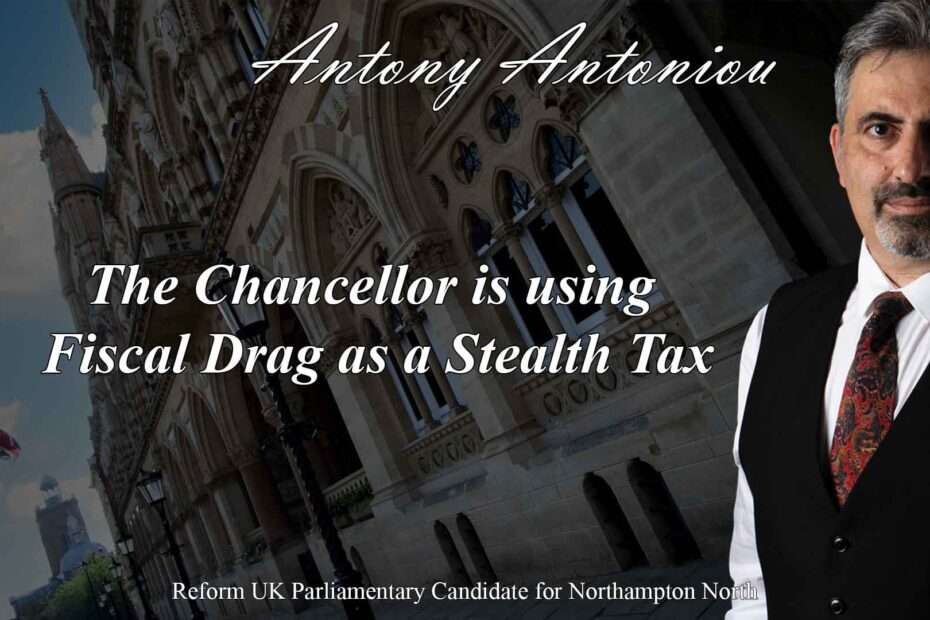The Chancellor is using Fiscal Drag as a Stealth Tax
Fiscal Farce: Millions of Brits Dragged into Higher Tax Brackets
A Lacklustre Budget for the Common Folk
The recent budget announcement by Chancellor Jeremy Hunt has left many ordinary Britons feeling underwhelmed and concerned about their financial futures. While the reduction in National Insurance contributions may put some extra pennies in people’s pockets, experts argue that the real impact is overshadowed by the stealthy fiscal drag – a hidden tax that’s dragging millions into higher tax brackets.
As prices and wages rise, the frozen tax thresholds mean that more individuals are being pushed into higher tax bands, effectively paying more in taxes despite modest income increases. This phenomenon, known as fiscal drag, is impacting a significant portion of the workforce, including middle-ranking professionals such as teachers, police officers, and nurses – individuals who should not be classified as higher-rate taxpayers.
The Hidden Tax: Fiscal Drag Unmasked
Fiscal drag is a silent tax that often goes unmentioned in budget speeches and policy announcements. It’s a consequence of the government’s decision to freeze personal allowances and tax thresholds, resulting in more people being pushed into higher tax brackets as their incomes rise, even modestly.
As wages creep up to keep pace with inflation, individuals find themselves crossing the threshold from basic-rate taxpayers to higher-rate taxpayers, without necessarily experiencing a substantial improvement in their standard of living. This hidden tax is arguably more powerful in its impact than the headline tax cuts touted by the Chancellor.
The Office for Budget Responsibility: Friend or Foe?
One of the key players in the budget saga is the Office for Budget Responsibility (OBR), an independent fiscal watchdog tasked with providing economic forecasts and analysis. However, the accuracy of the OBR’s predictions has been called into question, with some arguing that its recent projections have been wide of the mark.
The OBR’s influence is undeniable, as evidenced by its role in scaling back the Chancellor’s initial plans for income tax cuts. Hunt had initially aimed for a 2p reduction in income tax, a move that would have benefited pensioners, landlords, and workers alike. However, the OBR’s pushback forced a compromise, resulting in the National Insurance cut instead.
Critics argue that the OBR has become overly assertive, treating its forecasts as gospel and effectively dictating policy decisions. There are concerns that the watchdog has overstepped its bounds, wielding excessive power and potentially stifling measures that could provide much-needed relief to struggling households.
Geopolitics and the Economy: A Volatile Mix
As the Chancellor attempts to navigate the economic landscape, the ongoing geopolitical turmoil adds another layer of complexity. The war in Ukraine, fluctuating oil and gas prices, and global instability have all contributed to the volatile economic climate, making it challenging to accurately predict future trends.
While the government had initially hoped for incremental interest rate cuts by the Bank of England, coupled with tax reductions, to stimulate the economy, the shifting geopolitical dynamics have cast doubt on this strategy. Some analysts now suggest that inflation, initially expected to decrease to 2% in the summer, may start rising again, further complicating the economic outlook.
A Glimmer of Hope: Potential for Autumn Tax Cuts
Despite the challenges, there is still a glimmer of hope for those seeking tax relief. The Chancellor has hinted at the possibility of introducing tax cuts in an Autumn statement or spending review, ahead of the forthcoming general election.
By implementing tax cuts in stages – as seen with the National Insurance reduction in January and April – the government aims to provide incremental relief to taxpayers. The hope is that these tax cuts, combined with potential interest rate decreases by the Bank of England, could help alleviate the financial strain on households.
However, the success of this strategy remains uncertain, as the volatile geopolitical climate continues to influence economic conditions and policy decisions.
Conclusion: A Call for Transparency and Accountability
As the dust settles on the recent budget announcement, many Britons are left grappling with the reality of fiscal drag and its hidden impact on their finances. The lack of transparency surrounding this phenomenon has raised concerns about the government’s commitment to supporting the ordinary citizen.
Moving forward, there is a growing demand for greater accountability and clarity from policymakers and institutions like the OBR. Ordinary Britons deserve to understand the full implications of fiscal policies, including the often-overlooked effects of fiscal drag.
Ultimately, the success of any economic strategy will hinge on its ability to address the real concerns and challenges faced by the public. By prioritizing transparency, accountability, and a genuine understanding of the common folk’s struggles, the government can hope to regain trust and implement policies that truly benefit the nation as a whole.
Summary
• The recent budget left many ordinary Britons feeling underwhelmed and concerned about fiscal drag – a hidden tax dragging millions into higher tax brackets
• Fiscal drag occurs when frozen tax thresholds push people into higher tax bands as wages rise, resulting in higher taxes despite modest income increases
• It is impacting middle income professionals like teachers, police officers and nurses who should not be higher-rate taxpayers
• The Office for Budget Responsibility (OBR) forced Chancellor Hunt to scale back planned income tax cuts due to its forecasts
• Critics argue the OBR has become too powerful, treating its projections as gospel and dictating policy
• Geopolitical turmoil like the Ukraine war is adding volatility, making economic predictions difficult
• There are hints the Chancellor could introduce tax cuts in an Autumn statement ahead of the next election
• But success is uncertain given the volatile global situation
• There are calls for greater transparency about fiscal drag’s impact and accountability from policymakers

